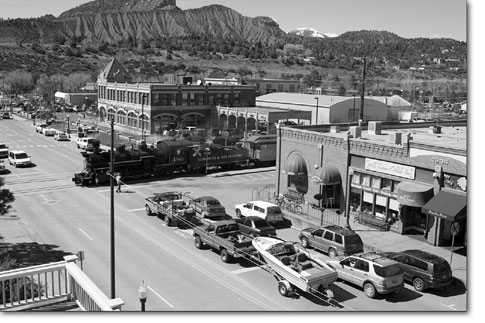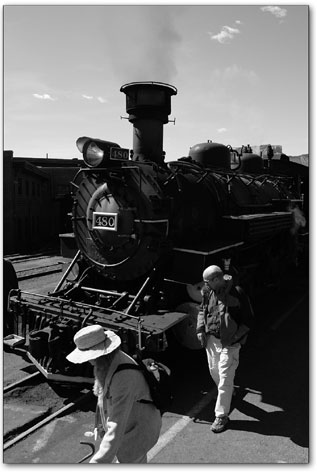| ||||
Train dodges clean air bill
by Missy Votel The issue of train smoke is heating up once again as state legislators and the state agency that oversees air quality face off over whether or not the Durango & Silverton Narrow Gauge Railroad should be exempt from clean air regulations. Last month, Margie Perkins, director of the air quality division for the Colorado Department of Health and Environment, notified owners of the D&SNGRR that the train is subject to regulations under the Clean Air Act, despite a long held belief to the contrary. “It’s been in dispute,” she said. “The claim was that (the train) was exempt under the steam locomotive classification. Basically, we undertook a study to see if this exemption existed and we determined that it did not.” To that end, Perkins said her agency, which is an independent state agency, notified the train about a month ago of the finding. “It turns out that federal laws do require them to be regulated,” she said. “We communicated this to them about a month ago in a formal letter.” However, Rep. Mark Larson, R-Cortez, and Sen. Jim Isgar, D-Hesperus, maintain they have seen no formal ruling from the state Attorney General’s office on the issue, and until they do, they’ll operate under the belief that the train is, in fact, exempt under federal laws. Both men recently supported language in an air-quality bill that would remove the D&SNGRR, as well as several other historic railroads in the state, from falling under any more stringent state regulations in the future. Termed an anti-backsliding bill, House Bill 1309, which is currently awaiting signature from Gov. Bill Owens, would maintain the state’s clean air standards in the face of loosened federal regulations. However, an amendment, which was originally introduced by Larson and then re-introduced by Sen. Joan Fitz-Gerald, D-Golden, protects historic steam locomotives in the state. Perkins said the exemption will take the teeth out of the bill, which is not designed to enforce anything per se, but rather to provide more access to citizen suits. “If citizens believe any state regulation is not being implemented appropriately and regulations are not being satisfied, they could bring an action suit,” she said. One such regulation deals with opacity, whereby smoke being emitted can’t obscure more than 20 percent of sunlight. It is does, mitigation measures must be taken. However, under the new legislation, the train would not be held by this rule. Both Isgar and Larson insist the verbage was not an attempt to give special treatment to the train, but to maintain status quo. “It just maintains current federal exemptions under law,” said Isgar. Larson said he came up with the amendment in light of “threatening” comments from Perkins whereby she referred to herself as “the wet blanket,” that “had the hammer” to come down on the train for clean air violations. “I was more worried about inappropriate comments that threatened the train,” he said. “The $100 million that the train contributes to the economy of Southwest Colorado was going to be put at risk by someone from a state agency.” According to Larson, by attempting to regulate the train above and beyond federal rules, Perkins’ agency is overstepping its boundaries.
“The state does not have authority beyond the federal government,” he said. “The state should not exceed what the federal government does.” Larson also pointed out that increased regulation is overkill given the train’s recent effort to mitigate coal smoke with the newly formed train smoke task force, made up of train officials, neighbors and local officials. “I have to keep reminding them that the train has come to the table,” he said. “I have assurances from the train that they will continue the process.” According to Isgar, the D&SNGRR has spent $500,000 on air-pollution controls as well as $10,000 for a study of the efficiency of the scrubber system. “That’s a pretty significant commitment,” he said. A phone call to train officials seeking comment was not returned. However, Wano Urbonas, environmental health director for San Juan Basin Health Department, said he sees the language as a loophole in the legislation. “Basically, I don’t understand why it was introduced. I was surprised to see Sen. Isgar and Rep. Larson support the bill,” he said. “It’s a see-saw, where the rest of the state will benefit, but Durango could suffer.” Although Urbonas noted that since the health department began testing pollution around the train, the train has not exceeded allowable levels, he said he saw no need for the amendment to the bill. “If the bill passes, I see no reason why there should be a special exemption for the train,” he said. Jerry Swingle, co-chair of the South Durango Neighborhood Association, which has worked over the years to decrease coal smoke emissions, said he was frustrated by the lack of input from residents. “We’re a little unhappy that local representatives saw fit to do that without consulting any of us,” he said. “It would have been good if they would have met with the (newly formed train) task force, city and county government, the train and train neighbors. They should have asked us, ‘Does this make sense?’” But Larson maintains that the entire process was above board and completely transparent. “I don’t think we blindsided anyone,” he said. He also noted that if and when the state attorney general does come out with a formal opinion on the exemption, it could be challenged in court. In the meantime, HB 1309 was delivered to the governor on April 4, after which time he has 10 days to sign it. Urbonas said whether the bill is signed or not, he was optimistic that negotiations with the train would continue on a good track, making the new legislation a moot point. “If local air-pollution prevention activities are successful, then it should be a non-factor,” he said. •
|
In this week's issue...
- December 18, 2025
- Let it snow
Although ski areas across the West have taken a hit, there’s still hope
- December 18, 2025
- Look, but don't take
Lessons in pottery theft – and remorse – from SW Colorado
- December 11, 2025
- Big plans
Whole Foods, 270 apartments could be coming to Durango Mall parcel



